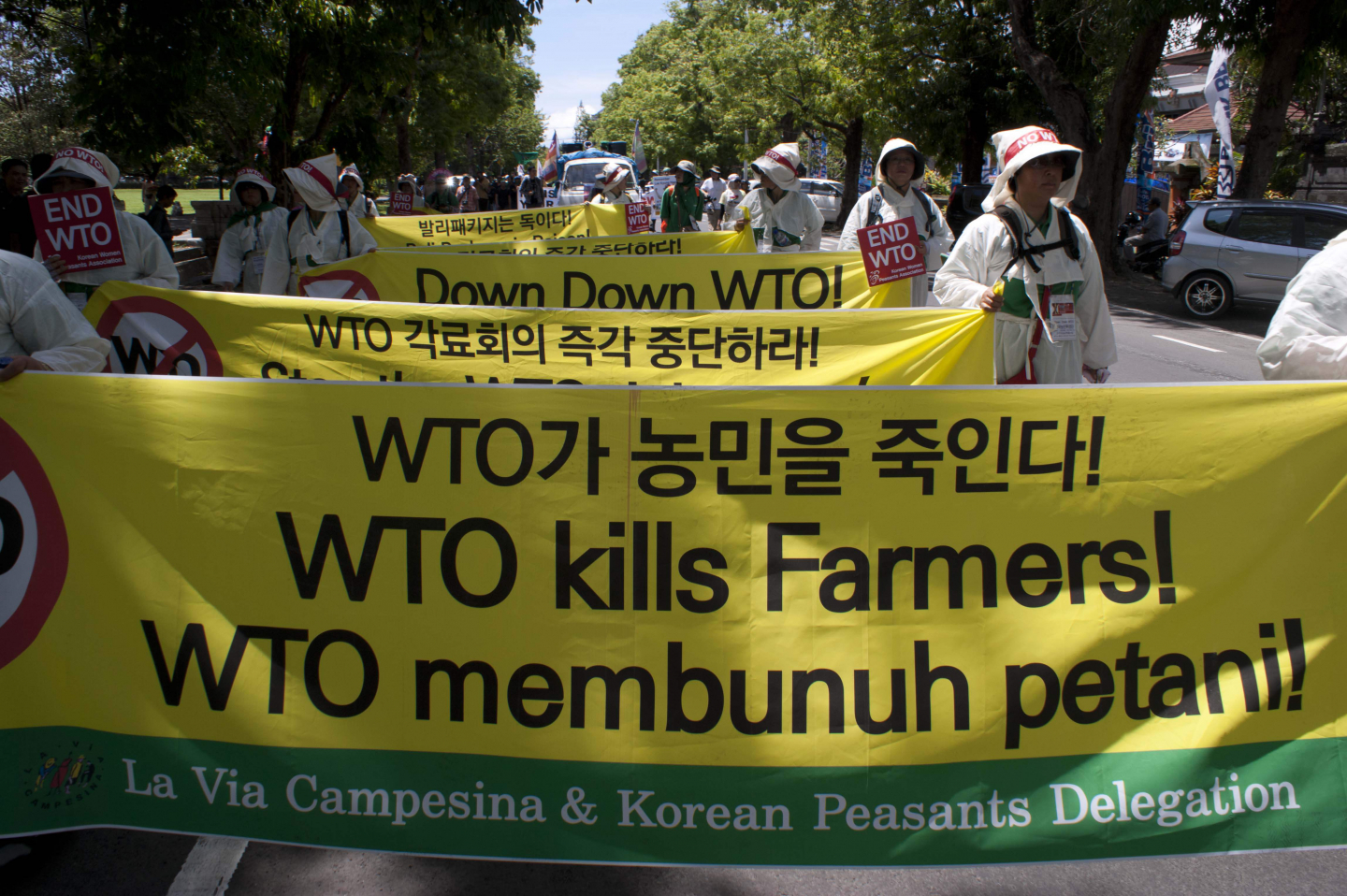The WTO was not ‘saved’ at the 9th Ministerial Conference. While developing countries managed to push back against one of the most damaging of existing WTO rules, the “price” extracted by powerful countries such as the U.S. was high, and the process to get the deal was wracked with unfair and undemocratic machinations. That avoiding a total meltdown has been touted as a breakthrough just shows how delegitimate the corporate-led model of trade liberalization embodied by the WTO has become.
This week’s 9th WTO Ministerial culminated a year of efforts by the United States to block a historic potential deal to modify one of the most damaging of existing WTO policies, which constrains developing – but not developed – countries from subsidizing their farmers to promote Food Security. But civil society pressure, particularly from the Right to Food campaign in India and global civil society, succeeded in bolstering India’s case and resulted in opening up some initial steps towards flexibilities for developing countries to reduce global hunger. Still, the overall package from Bali is immensely unbalanced, given that it imposes new obligations on developing countries on Trade Facilitation, while policies demanded by Least Developed Countries remain optional. It also fails to respond to the urgent need for serious transformation of the global trade and economic system in light of the global food and economic crises.
Rules on agricultural subisides in the WTO are massively stacked against developing countries and the poor worldwide. Negotiators here in Bali failed in the urgent need to permanently change the current WTO agricultural rules. But India was successful in its hard-won campaign to at least prevent that the “Peace Clause” in which countries agree to desist from filing disputes against each other would expire before a permanent solution is agreed. Unfortunately, the Peace Clause only applies to existing Food Security programs, leaving out poor countries that might be in the process of developing such programs. Details remain to be interpreted, but what is clear is that developing countries should not have had to fight so hard for a small “roll-back” of existing harsh rules. The resistance within the WTO to these obviously needed changes exposed dramatically to the world that agricultural rules in the WTO, which promote liberalization in agricultural trade, rather than Food Security, farmers’ livelihoods, or rural development, are completely unacceptable in the context of price volatility, global hunger, and rural impoverishment, a subject which must be taken up by civil society and governments worldwide.
We are dismayed that governments agreed to lopsided, unfair deal on Trade Facilitation. The deal on Trade Facilitation – which was shamelessly over-hyped in the media in terms of claimed economic gains - represents more of the same failed model of pro-corporate globalization and liberalization. The bad deal binds developing countries to the customs and port-of-entry policies and procedures that rich countries have implemented over many decades to their own advantage, imposing excessive regulatory, human resources, and technological burdens on developing countries. In the future, we must ensure that developing countries have the full sovereignty to assess their own levels of capacity before any potential implemention the rules, and that developed countries must come through with commitments to provide financial resources for poor countries to modernize their facilities, so that developing countries do not have to prioritize computerizing their customs offices over their schools, and improving infrastructure at ports rather than at hospitals.
The package of policies for the LDCs, which members agreed to almost a decade ago but have failed to implement, is completely non-binding. It is shameful that it was held hostage to rich country demands pro-corporate on Trade Facilitation. This state of unfairness further exposes the WTO as an institution that facilitates the corporate priorities of developed countries over the needs of the poorest members.
The Bali Ministerial embodied the unequal, un-transparent, and un-participatory nature of negotiations at the WTO. After being called to a “non-negotiating Ministerial,” to which many countries sent small delegations, back-room, off-schedule negotiations were held between only a few countries, in which text which had been hotly disputed for months, suddenly appeared as a take-it-or-leave-it text, giving Ministers only three hours to finally approve the package.
A clearly defined work program on the remaining Doha Development Agenda issues is to be prepared by the WTO Trade Negotiations Committee within the next 12 months. As civil society organizations, we shall campaign to ensure that this program does not entrench existing inequalities in the multilateral trading system. Developing countries need a permanent and full solution to unequal rules in agriculture,, as well as serious treatment of the “implementation issues” outlined in Cancun, in order to promote an agenda of decent jobs, food security and sustainable development.
We will likewise campaign to ensure that topics such as Singapore issues of investment, government procurement or competition, which have been repeatedly rejected by WTO membes, are not included in any future work program. Further, we warn members to avoid the backdoor inclusion of such issues through the disguise of “global value chains”, and to reject work programs that lead to further liberalization of services, non-agricultural market access, environmental goods, or the so-called emerging or 21st century issues.
The deal is far off from the development proposals of developing countries which were pushed aside in the negotiations. The agenda on the table this week was also a poor response to the urgent needs of serious transformation of the global trade system, embodied in the corporate globalization model of the WTO. Our World Is Not for Sale network reiterates its call for a completely transformed global trade system that promotes Food, Jobs, and Sustainble Development.
Our World Is Not For Sale er eit globalt nettverk av sivilsamfunnsorganisasjonar som Handelskampanjen er ein del av.

